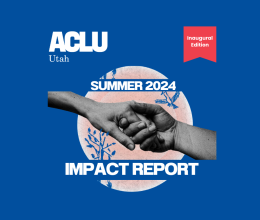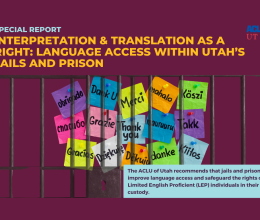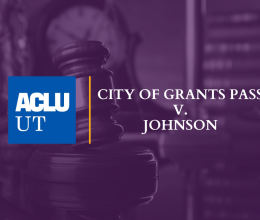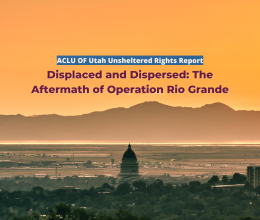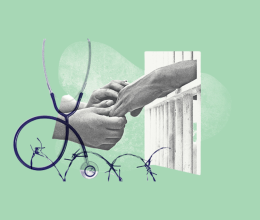
Brief Argues that the Constitutional Prohibition on ‘Cruel and Unusual Punishments’ Prevents Cities from Arresting or Fining People Experiencing Homelessness for Sleeping in Public
WASHINGTON - The American Civil Liberties Union of Utah Foundation (ACLU of Utah), ACLU, and affiliates in 17 states submitted a friend-of-the-court brief today in the U.S. Supreme Court in Grants Pass v. Johnson, arguing that the Eighth Amendment’s prohibition on cruel and unusual punishments does not allow cities to issue fines or arrest people for sleeping outside in public when they have no access to adequate shelter.
Grants Pass v. Johnson involves an Oregon town that passed ordinances barring people from sleeping outside in public using a blanket, pillow, or even a cardboard sheet to lie on. Last year, the Ninth Circuit Court of Appeals ruled that criminally punishing unhoused people violates the Eighth Amendment “if there are no other public areas or appropriate shelters where those individuals can sleep.”
The ACLU’s amicus brief argues that the original intent and meaning of the Eighth Amendment squarely protects unhoused people from the cruel and unusual punishment of being arrested or fined for simply existing.
“There is no punishment that fits the ‘crime’ of being forced to sleep outside. Arresting and fining unhoused people for simply existing is a profound betrayal of the respect for human dignity that the Supreme Court has long recognized is at the core of the Eighth Amendment’s protections,” said Scout Katovich, staff attorney with the ACLU Trone Center for Justice and Equality.
“Everyone in America is entitled to protections guaranteed under the U.S. Constitution. These rights remain even amidst experiences of homelessness. The practice of ensnaring unsheltered individuals in the criminal legal system through arrests, citations, and fines perpetuates the cycle of poverty while trampling upon their civil rights and liberties," said Aaron Welcher, Communications Director at the ACLU of Utah. "We need a paradigm shift towards prioritizing housing over handcuffs, upholding the constitutional rights of all individuals, regardless of their housing status.”
The Eighth Amendment’s broad language prohibiting the infliction of “cruel and unusual punishments” was inspired by the English Bill of Rights, and was understood at the time of its adoption to the U.S. Constitution to embody the principle of proportionality, meaning that a punishment must be appropriately tailored to the seriousness of the offense. In Grants Pass, where the “offense” involves sleeping outside where no alternative shelter exists, any punishment, including the fines and jail time imposed by Grants Pass, is plainly disproportionate.
“When applied to people with nowhere else to go, the ordinances in this case disproportionately punish unavoidable, life-sustaining, and fundamentally human acts. Punishing the most vulnerable among us for such behavior violates the Eighth Amendment,” the brief reads.
The brief further warns that the narrow view of the Eighth Amendment pushed by Grants Pass and others in support of the city, which argues that the amendment speaks only to the method of punishment, is untethered to the original meaning and decades of Supreme Court precedent. Under the city’s argument, because hundreds of dollars of fines and 30 days in prison are not inherently cruel punishments, they are constitutional, regardless of the crime or circumstances of the person being punished. This twisted logic ignores the Eighth Amendment’s prohibition on disproportionate punishment, which the Supreme Court has used to bar making it a crime to be addicted to drugs and to ban the death penalty for children and people with intellectual disabilities, for example.
The amicus brief was filed by the national ACLU and ACLU affiliates in Alaska, Arizona, Northern California, Southern California, Delaware, Hawaii, Iowa, Kansas, Kentucky, Missouri, Montana, New Hampshire, New Mexico, New York, Oklahoma, Oregon, South Carolina, Utah, and Washington.
The brief is here.
The statement is online here
###

